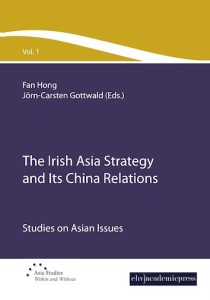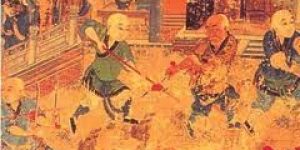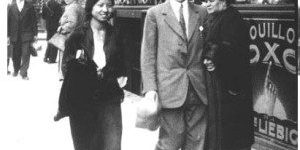Chapter 9: Friendship Between Citizens – The Twinning Of Cities ~ The Irish Asia Strategy and Its China Relations
No comments yet Introduction
Introduction
In “A Decade of the Asia Strategy”[i], it is noted that Twinning Initiatives between Irish and Asian cities, towns and regions can assist the further development of personal and business relationships. The concept is popular in Asia and it has a positive contribution to make in strengthening country-to-country ties, facilitating the development of business relationships that require a foundation of mutual confidence and trust. China is a priority country in the Asia Strategy.
On 19th May 2005, the Shanghai Municipal People’s Government and Cork City Council concluded a Sister City Agreement in Cork City Hall. The agreement was signed by the Lord Mayor of Cork, Cllr. Sean Martin and the Chairman of the Shanghai People’s Congress, Mr. Gong Xue Ping. The text of the agreement is set out in Appendix I (see below). Key principles are the benefits that the relationship will bring to the citizens of both cities and the focus on collaborative projects that “deliver tangible results and on co-operations that will give the citizens of both cities an opportunity to meet and work together, thus increasing mutual understanding”.
A Memorandum of Understanding establishing a further five year programme was signed on March 27th 2009 in the Shanghai City Hall by the Deputy Lord Mayor of Cork, Cllr. Patricia Gosch and the Vice Mayor of the Shanghai Municipal People’s Government, Mr. Tang Dingjie. This programme will focus on City Government, Education, Business, Culture and Tourism. A copy of the Memorandum of Understanding is set out in Appendix II (see below).
This chapter describes Cork City Council’s experience of the Sister City relationship with Shanghai and the contribution of this process to the achievement of the objectives of the Asia Strategy. It will examine the background to the project, principal activities, barriers and future plans.
Background
The Shanghai – Cork Sister Cities Project is a formal agreement between the Shanghai Municipal People’s Government and Cork City Council to provide a framework for co-operation projects between the two cities. The purpose is to develop deep and long-lasting ties between the citizens and organisations of both cities that will promote mutual understanding and bring benefits to the participants. Whilst it is recognised that the development of trade is the primary objective of the Asia Strategy, the purpose of the Sister City Project is wider, encompassing local government, business, education, culture and tourism, in the development of close contacts between the two cities.
The initial contacts between the cities in 2002 and 2003 were fostered by the Irish Department of Foreign Affairs and the Chinese Ambassador to Ireland, Dr. Sha Hailin[ii]. The Irish Consuls General in Shanghai, Geoffrey Keating[iii] (2000-04), Nicholas O’Brien (2004–08) and Conor O’Riordan (2008-present) have also fully supported the process. Since 2002, the Irish Government has operated a Shanghai Intern Programme for officials from Shanghai. These officials visited Cork in 2002 and 2003 and, following preliminary discussions, both city administrations agreed to explore more formal links. University College Cork had also developed links with a number of Chinese universities and had over 100 Chinese students in 2003.
In February 2004, the Lord Mayor of Cork, Cllr. Colm Burke, made an official visit to Shanghai at the invitation of the Shanghai Municipal Government and was accompanied by the City Manager – Joe Gavin; President of Cork Chamber – Robin O’Sullivan; Prof. Kevin Collins and Prof. Gabriel Crean of University College Cork. This delegation was met by Vice Mayor Yan Junqi (who is currently the vice chairwoman of standing committee of the National People’s Congress of the People’s Republic of China and the chairwoman of China Association for Promoting Democracy) and also visited Fudan University, which already has links with University College Cork.
On returning from Shanghai, Cork City Council established the Shanghai Project Group to manage the developing relationship with Shanghai. The members were drawn initially from Cork City Council, Cork Chamber and University College Cork. The current membership is set out in Appendix III. This project group meets quarterly to review progress and develop new projects.
The establishment of a formal relationship with Shanghai presented challenges to Cork City Council. Shanghai is a vast city with a population of c. 20m, a very different culture and located 12 hours flying time away. Shanghai had formal Sister City agreements with over 60 cities and used the process in a strategic way to build contacts in the wider world. In contrast, Cork had a population of 250,000 persons in the wider metropolitan area and had formal twinning arrangements with Coventry (England), Rennes (France), Cologne (Germany), San Francisco (USA) and Swansea (Wales).
However, both cities were ports, had a history of trade and placed a great emphasis on education. In addition, both cities are the “second cities” in their respective countries and both were located in traditional societies that, after periods of colonisation, were evolving rapidly and facing the challenges of globalisation, not just economic but cultural as well. There are lessons that can be learnt from each city’s experiences of dealing with these issues.
In discussions, the Shanghai Government placed great emphasis on the relationship being established on a sound basis with tangible results, so that its value can be clearly demonstrated to the citizens of each city and to the respective national governments. Both cities appointed contact persons to progress the process – Ms. Lu Yingying for Shanghai (subsequently replaced by Ms. Tu Anyu) and Mr. Pat Ledwidge for Cork. The city governments would act as facilitators to initiate projects, which hopefully become self – sustaining. The initial focus of the relationship was to be on education, culture and business. It was also decided to extend the Shanghai Intern Programme to Cork. This programme involved two officials from the Shanghai Municipal People’s Government staying in Cork for a period of eight weeks. The officials would attend language classes in the mornings and work with the City Council in the afternoons.
Cork City Council identified a number of issues that were crucial to the success of the relationship. The difference in scale and the distance between cities created immediate barriers. For example, the Foreign Affairs Office in the Shanghai Municipal People’s Government had a staff complement of over 300 people whilst Cork City Council’s total staff number is c. 1,600.
However a basis strategy was devised to keep a momentum in the relationship over the long-term through:
– Contacts and relationships created through the Intern Programme;
– Carrying out at least two projects per year;
– Spreading the opportunities for contact as widely as possible within the city.
The Shanghai Municipal People’s Government received approval to conclude the Sister City Agreement in late 2004 and Cork City Council approved in November 2004.
The Agreement itself was concluded in May 2005 as part of a three day programme of events that included a business forum and tourist forum. Over 130 delegates travelled from Shanghai to Cork including a full orchestra, 30 business people, 10 tourism enterprises and government officials. The events included a business forum; tourism forum; cultural performance in Cork City Hall (attended by 800 people); visit to University College Cork (including planting of a Magnolia tree – symbol of Shanghai) and exhibitions in the City Library and Millennium Hall. An hour-long programme of the visit was shown subsequently on Shanghai Television at prime time and attracted a large audience.
Since 2005, the relationship between the two cities has developed and been strengthened by the activities described below.
City Government
The Shanghai Internships Programme is a national programme that provides for exchanges of officials. It has been successful in developing important contacts within the Shanghai Municipal People’s Government and the governments of the neighbouring cities of Suzhou, Hangzhou and Wuxi. The programme has two elements:
– 10 Chinese officials visit Ireland for 9-10 weeks in July and August each year
– Six Irish officials visit Shanghai and its neighbouring cities in late Autumn
The national programme began in 2002 and, since 2004, two interns have been based in Cork each year for eight weeks. Five Cork City officials have participated in the return delegations to Shanghai. Typically the Intern programme consists of a two week orientation period in Dublin and then the 2 officials travel to Cork. The eight-week Cork Programme involves language classes in UCC each morning and working in Cork City Council three days per week in the afternoon. The interns also make contact with local organisations and with organisations participating in co-operation projects with Shanghai. Since 2005, Cork City Council has funded the Cork element of the programme. An important element of the programme is that the interns stay with local host families and get a rounded picture of Irish life.
The Dublin-based interns make a three day visit to Cork each year for a typical programme of meetings with Cork City Council, IDA Ireland, University College Cork and Cork Institute of Technology with some sightseeing visits.
The Intern Programme has been particularly valuable in building contacts, which is very important in developing any relationship with Chinese organisations. There have been 12 Cork-based interns and over 40 in total since the project commenced. Contacts have been maintained with the Shanghai-based interns and they have proved very helpful in developing co-operation projects and facilitating visits.
One of the positive outcomes of these contacts is the number of delegations from the Shanghai Municipal and District Governments that visit Cork each year. In the period since the conclusion of the Memorandum of Understanding in March 2009, 13 delegations have visited Cork resulting in a rich diversity of contacts being established (see Appendix V).
Education
The principal goal of the Sister City Agreement between Shanghai and Cork is to develop deep and long-lasting ties between the two cities. Education is a vital part of this process as it is a primary process to developing mutual understanding and overcoming language and cultural barriers.
Both University College Cork and Cork Institute of Technology are members of the Shanghai Project Group (see Appendix III). University College Cork has very active links with a number of universities in China and was one of the key contacts in establishing the relationship. These links are detailed by Prof. Fan Hong in Chapter 10. It should however be noted that UCC has established the Irish Institute of Chinese Studies (IICS) under the direction of Prof. Fan Hong. The IICS offers undergraduate and post graduate qualifications and evening courses for the public. The first group of students from the MA in Contemporary Chinese Culture and Business arrived in Shanghai in March 2008 to commence three months study in China. A second group spent one year in China starting in the autumn of 2008.
The International Students Office also plays a key role in the relationship between the two cities as it is responsible for attracting Shanghai students to UCC and ensuring they settle in their new surroundings.
For the past five years, Cork City Council has been working with nine schools in the city (five post primary schools, three primary schools and one post Leaving Cert College) on a twinning project with their schools in Shanghai. This project brings the partnership between the two cities alive at the level of the citizen and, through the schools, reaches into the centre of local communities.
In October 2007, teachers from these schools visited Shanghai, met their counterparts in their schools and exchanged ideas for co-operation projects. One year later in October 2008, these schools signed memoranda of understanding with each other. The participating Cork schools and their Shanghai partners are set out in Appendix IV.
This project will develop an awareness of Shanghai and Cork in their respective schools and will hopefully cultivate an interest in China in the Cork schools that will inspire some of the students to pursue this interest at third level through the qualifications offered by the Irish Institute of Chinese Studies. The IICS established a Confucius Institute in partnership with Shanghai University and is currently developing a pilot programme for teaching Mandarin in over 20 schools in Cork and also developing cultural awareness. It is also hoped to develop a programme at national level to organise and fund links with Asian schools such as those administered by Léargeas for European links. Cork City Council is represented on the board of the Confucius Institute.
Cork Institute of Technology is also developing links for some of its constituent colleges with similar institutions in Shanghai. The Crawford College of Art and Design visited Shanghai University in 2009 and a return visit is being planned.
Culture
The cultural links between Shanghai and Cork were established well in advance of the Sister City Agreement being signed in 2005. Two Shanghai cultural organisations performed in Cork in October and November 2004 as part of the build up to 2005 when Cork became the European Capital of Culture. A performance was staged by the Shanghai Dramatic Arts Centre at the Cork Opera House of “Chang Hen Ge” in October 2004, followed by a performance in City Hall by the Shanghai Percussion Ensemble.
To coincide with these performances, a delegation from the Shanghai Municipal Administration of Culture, Radio, Film and TV visited Cork and attended a reception hosted by the Lord Mayor and a meeting with Cork cultural organisations to explore future contacts. The delegation leader was Mr. Mu Duan Zheng. This meeting formed the basis of an excellent working relationship with this organization which oversees all cultural activity in Shanghai.
As part of the 2006 St. Patrick’s Day Festival, Cork City Council invited a Huju Opera Troupe from Changning District in Shanghai to perform in Cork. Huju Opera originated in the folk ballads of the countryside around the Huangpu River which flows through Shanghai and is sung in the Shanghai dialect. The Changning Troupe is famous in China and this was the first time it had performed overseas. The delegation was led by Ms. Wang Ya Ping, Executive Vice-President of the Shanghai Changning Chinese Overseas Friendship Association.
Thirty one members of the troupe visited Cork and performed in the theatre at Cork Institute of Technology. The reaction of the audience was very positive. The eight piece orchestra, which played traditional instruments, also held workshops in three local schools during the visit – Presentation Girls’ Secondary School Ballyphehane, Ursuline Convent Secondary School Blackrock and Coláiste Choilm Ballincollig. Members of the delegation also attended the Lord Mayor’s Ball.
The Shanghai Library and Cork City Library have also established links. The Shanghai Library presented a gift of 800 books when the Sister City Agreement was signed and an exhibition of some of these books called “Window on Shanghai” was held to coincide with the visit of the delegation from Shanghai. The Shanghai Library has made a further gift of books and visited Cork in 2007 to discuss the plans for the extension of the City Library in Grand Parade as the Shanghai Library is also commissioning a new building.
Other activities over this period have included:
– September 2005 Participation of Ms. Wang Zhousheng in the Frank O’Connor International Festival of the Short Story.
– September – October 2005 Visit of Niamh Lawlor of Cork Artists’ Collective to Shanghai.
– November – December 2005 Visit of artists Da Fei and Sun Xin Cong to Cork for residency and exhibitions.
– March 2006 “Shanghai Images” Exhibition held in Cork Vision Centre from March 3rd to March 28th displaying photographs presented to Cork by the Shanghai Archive.
– March – June 2006 Photographer Mr. Robert O’Connor undertook a three-month residency in Shanghai supported by Cork City Council, the Arts Council and Culture Ireland. He produced many images in Shanghai and lectured at Fudan University, and the China Academy of Fine Art, Hangzhou. He held an exhibition in Hangzhou. Mr. O’Connor was assisted in Shanghai by the Consul General of Ireland, Mr. Nicholas O’Brien. He also received extensive advice and assistance from the Shanghai Foreign Affairs Office and the Shanghai Photographer’s Association. He held a subsequent Exhibition in April 2007 at the famous Eastlink Gallery Shanghai.
– May 2006 Visit to Shanghai by the Cork Children’s Chorus with assistance from the Shanghai Foreign Affairs Office and Shanghai Association for Friendship with Foreign Countries. Contacts were made with the Shanghai Children’s Palace, Shanghai Municipal Children’s Choir and Shanghai Youth Centre.
– November 2006 Visit to China by the UCC-based Vanbrugh String Quartet which included performances in Shanghai.
– May 2007 Visit by delegation from Shanghai Library led by Mr. Zhou Derning, Deputy Director. The purpose of the visit was to develop ideas on provision of new libraries.
– November 2007 Liz Meaney, Arts Officer with Cork City Council led a delegation of 10 Cork arts and culture organisations to Shanghai for a week-long programme of meetings with their counterparts.
– October 2008 Cork City Council participated in the Shanghai International Arts Festival where Cllr. Tony Fitzgerald, Chair of the Arts Committee gave a well-received presentation on the Cork’s Year as European Capital of Culture.
– October 2009 Exhibition “Shanghai & Cork: threads through history” opened by the Chinese Ambassador to Ireland, H.E. Liu Biwei at the Cork Public Museum. This exhibition paralleled the development of Shanghai and Cork from 1840 to the present. It contained material donated by the Shanghai Art Museum and the Shanghai Women’s Federation.
– January 2009 and February 2010 Celebration of the Chinese Spring Festival (New Year) in City Hall with performances by students and staff from University College Cork and visiting performers from Shanghai.
Business
Cork Chamber is an active participant in the Sister City programme. Increasing business contacts was identified as an objective of the Shanghai-Cork Sister City project from the beginning. It is not possible to record all of the contacts that have developed between individual companies. However, there have been important events:
– May 2005 A Business Forum was one of the events held in Cork as part of the programme celebrating the conclusion of the Sister City Agreement. This event was organised by Cork Chamber and attended by 30 Shanghai companies and local businesses also. The Shanghai Chamber of International Commerce and Shanghai Federation of Industry and Commerce both sent delegations to this event.
– October 2006 Visit to Shanghai by delegation of 20 organizations from Cork Chamber at invitation of Shanghai Chamber of International Commerce supported by Enterprise Ireland and the Irish Consul General in Shanghai. The members of the delegation were from the tourism, engineering, education, construction and software sectors. A Memorandum of Understanding was signed between the two organizations.
– August 2009 Visit to Cork by the Shanghai Federation of Industry and Commerce, which included the conclusion of a Memorandum of Understanding with Cork Chamber and a business networking event.
In addition, the formal relationship between Shanghai and Cork has made it easier to work with the Chinese Embassy officials to assist individual businesses with inquiries.
Tourism
Tourism was also identified as a pillar of the Sister City relationship between Shanghai and Cork. Tourism links are still developing but face some of the barriers listed below. Under an agreement signed in 2004 with China, Ireland was accorded “Approved Destination Status”. A framework has been established under the agreement which facilitates organised group tourism from China to Ireland. The first official tour from China visited Cork in 2005.
Tourism Ireland now has an office in Shanghai and Cork City Council has hosted a number of delegations from Shanghai and its neighbouring provinces that have come to Cork to explore it as a tourism destination. Two film crews have also visited Cork from Shanghai TV and CCTV (the main tv company in China) and their programmes have attracted a combined audience of 22m people.
A more unusual event occurred on Wednesday October 24th 2007, when the Concert Hall in City Hall played host to the highly impressive “Rose Wedding Ceremony”. The Rose Wedding is a huge Chinese festival celebrating marriage, which takes place every October in Shanghai. The streets come alive during the festival, with street parties and entertainment, as the newlyweds are paraded like celebrities around the city.
As part of the experience, a Rose Wedding Committee works closely with a Chinese travel agency to select a destination for the Rose Wedding Honeymoon. As a direct result of approaches from Tourism Ireland, the Rose Wedding Committee was invited to Ireland on a familiarization visit and, as a result, Ireland was chosen as the destination for this year’s Rose Wedding honeymoon. The newlyweds, accompanied by Tourism Ireland, traveled around many of Ireland’s beautiful regions including Limerick, Cork, Clare, Waterford and Dublin. As Cork is Shanghai’s Sister City, Cork City Council was chosen to be an important link in this event. Every step of the trip, including the ceremony in City Hall was filmed by the Chinese Saturday night prime-time show, “Dating on Saturday”, which has an audience of over 1.6 m people.
Barriers
Notwithstanding the success of the co-operation programmes between Shanghai and Cork, there are significant barriers that need to be addressed if the overall project is to continue. There barriers are:
a. Physical Distance
b. Language
c. Difference in scale between the two cities
d. Work restrictions on bona fide students
e. Visa requirements
f. Graduate employment opportunities
The physical distance between the two cities places a constraint on visits. It can take 21 hours to reach Shanghai from Cork and basic air fare is in excess of € 900. In addition, the distance and time mean that visit times are extended to allow a recovery period, which in itself adds to the cost of projects that must at some stage have a face to face element in order to be meaningful. Thus, a basic cost is added to all projects over and above that experienced in co-operation projects with European cities.
There are a number of ways to overcome this barrier, depending on the type of project proposed. Depending on the purpose of the visit, the Shanghai Municipal People’s Government and/or Cork City Council are in a position to offer assistance. An extension of this approach would be the creation of a funding stream under the Asia Strategy, as twinning initiatives are specifically mentioned in the Asia Strategy.
It is also possible to reduce costs through “home stay” accommodation and this would be particularly appropriate in school exchanges. This has the added advantage that it allows the person experiencing the home stay to encounter the host culture at a deeper level. Home stay is an integral part of the Intern Programme.
For delegations from Shanghai, it is possible to include Cork in a programme of visits to a number of European Sister Cities, as Shanghai has in excess of 60 Sister Cities.
Language can also be a communication barrier and this can inflate the costs of projects through translation costs. However, the purpose of the overall project is to develop a deeper understanding of each other’s people and culture and language is a fundamental element of this. It is hoped that, over time, language will become a decreasing barrier.
In Shanghai, most children commence English classes at age six to seven and there is a growing familiarity with English. Chinese courses have commenced in UCC as part of undergraduate and post graduate studies and in evening classes. Mandarin Classes are also currently being piloted in post primary schools in Cork and the schools currently participating in the Sister City Schools Programme are ideal candidates.
The difference in scale between the two cities can also be a barrier but it can be argued that this is primarily a perception issue, as the types of co-operation projects that are promoted will be generally between individual organisations such as schools or cultural institutions. In addition, contact have been made with some of the 19 District Governments in Shanghai and this gives a more local and citizen-based character to projects. These contacts have been developed through the Intern Programme and so far projects have been initiated with the Luwan, Changning and Zhabei Districts. The basic strategy in dealing with the scale of the two cities has been to ensure that the relationship remains sustainable in cost and relevance terms. This has been achieved by concentrating on one or two large projects per annum and placing a premium on face-to-face contacts.
Education is one of the pillars of the Sister City Agreement and Cork benefits from Chinese students coming to Cork to pursue third level education and to learn English. These visits can be short- or long-term. This interaction is also an excellent way for individual contacts to be established between citizens of both cities and these contacts can form into long-term friendships. This is the overall goal of the Sister City Agreement. As Shanghai students are not EU residents, their tuition fees for third level education courses are doubled in general. Also, accommodation and living expenses are considerably higher in Cork than in Shanghai. The visiting students may thus need to supplement their income with part-time employment. The regulation introduced in 2005 limits work permits to students attending courses of at least one year’s duration and recognised by the Department of Education and Science. This impacts negatively on shorter language courses in particular and will affect less well-off students in particular.
A barrier to the development of tourisms contacts with China is the lack of direct flights between Shanghai and Cork (and between China and Ireland). This is compounded by the fact that Chinese citizens are required to have an additional visa for any country that they transit through en route to Ireland.
As the number of Shanghai students obtaining third level qualifications in Ireland continues to increase it provides an opportunity for the country to benefit from their skills when they graduate, particularly as labour shortages continue in key professional and technical areas. Providing graduates with additional time to gain employment experience will also deepen their contact with Cork which is the key goal of the Sister City Agreement.
Conclusion
Cork City Council is committed to the continuation of its productive relationship with the Shanghai Municipal People’s Government. The past five years have demonstrated the potential for real, sustainable contacts between the citizens in both cities and the benefits that will accrue to each city. Under the terms of the Sister City Agreement concluded in 2005, it was reviewed in 2009 and a new programme agreed.
There are three basic challenges facing the project:
a. How to overcome the distance barrier?
b. How to continue to make the relationship real for the citizens of both cities?
c. How to identify issues of mutual concern to both cities and devise appropriate co-operation projects to deliver real benefits?
The people and organisations involved in the process in both Shanghai and Cork will continue to meet these challenges in developing the relationship between the two cities.
Appendix I – Text of Sister City Agreement
Agreement on the Establishment of A Sister-City Relationship between the City of Cork of the Republic of Ireland and the City of Shanghai of the People’s Republic of China
Having worked over the past two years to promote a deeper affiliation between Cork and Shanghai, and in the context of the developing relationship between the Irish and Chinese peoples, the cities of Cork and Shanghai wish to develop a long-term relationship that will be of benefit to the citizens of both cities.
To provide a framework for this relationship, the Cork City Council and Shanghai Municipal People’s Government agree to establish a Sister-City relationship that will focus initially on business, tourism, culture and education linkages.
The two cities will also place a high priority on collaborative projects that deliver tangible results and on co-operations that will give the citizens of both cities an opportunity to meet and work together, thus increasing mutual understanding.
Both cities will record the activities carried out under this Agreement and review the programme every two years. Opportunities to strengthen the relationship between the two cities will be identified and realised on an ongoing basis.
This Agreement has been signed in the City of Cork on May 19th 2005 in the Irish, Chinese, and English languages with all three texts being equally authentic.
Cllr. Seán Ó Martín
Lord Mayor of Cork ,
Representative of Cork
Mr. Gong Xue Ping
Chairman, Shanghai People’s Congress
Representative of Shanghai
Appendix II – Text of Memorandum of Understanding
Memorandum of Understanding on the Future Development of the Sister-City Relationship between the City of Cork of the Republic of Ireland and the City of Shanghai of the People’s Republic of China (2009 – 2014)
Cork City Council and the Shanghai Municipal People’s Government signed a Sister-City Agreement on May 19th 2005. That Agreement focused on business, tourism, culture and education links. Having carried out a review, both city governments are very pleased to note that many activities have been carried out between both organisations and individuals from Cork and Shanghai under the aegis of the Sister-City Agreement.
Given the growth in contacts between the two cities, Cork City Council and the Shanghai Municipal People’s Government have decided to implement a Memorandum of Understanding to identify future activities. The Agreement signed in 2005 governs the Sister-City relationship and this Memorandum of Understanding is subsidiary to that Agreement.
The following activities will be pursued during the next five years:
I. City Government
– Continue to support activities under the Sister City Agreement.
– Continue the Intern Programme.
– Support visits by delegations and individuals to examine local government issues.
– Cork will develop further contacts with the District Governments of Shanghai.
– Participation by Cork in the Irish Pavilion at the Shanghai EXPO 2010.
– Maintain a record of activities under the Sister City Agreement.
II. Education
– Support the further development of academic links, both teaching and research, between the higher education institutions in the two cities.
– Support the development of the University College Cork (UCC) Confucius Institute which is in partnership with Shanghai University.
– Encourage and support scholarly exchanges by undergraduate and postgraduate students from higher education institutions in the two cities.
– Continue the Shanghai – Cork Schools programme.
– Support the establishment of the Confucius Classroom Programme for schools in Cork.
III. Business
– Explore the potential of Cork as a destination for Chinese companies locating functions in overseas locations;
– Develop opportunities to support work placement/internships for undergraduate and postgraduate students in companies in Cork and Shanghai.
– Development of business links between indigenous companies based in Cork and companies in similar business segments in Shanghai.
IV. Culture
– Support cultural contact between organisations in both cities through visits by individual organisations, attendance at festivals and activities which will deepen artists’ understanding of each city.
V. Tourism
– Continue to build on the work and relationships fostered to promote both cities as attractive leisure and business destinations, communicating the assets of the each city through organised seminars, shows and festival attendance.
Progress under this Memorandum of Understanding will be monitored annually and formally reviewed in 2014.
This Agreement has been signed in Shanghai on March 25th 2009 in the Irish, Chinese and English languages, with all three texts being equally authentic.
Tang Dengjie Cllr.
Vice Mayor Deputy Lord
Representative of Shanghai
Patricia Gosch
Mayor of Cork
Representative of Cork
Appendix III – Shanghai Project Group 2010
Cllr. Patricia Gosch – Cork City Council (Chair)
Cllr. Mary Shields – Cork City Council
Cllr. Ger Gibbons – Cork City Council
Mr. Joe Gavin Cork – City Council
Mr. Patrick Ledwidge – Cork City Council
Ms. Liz Meaney Cork – City Council
Ms. Noreen Mulcahy – Cork City Council
Ms. Mary Mannix Cork – City Council (Secretary to the Group)
Mr. Conor Healy – Cork Chamber
Mr. Michael Delaney – Cork Institute of Technology
Mr. Ed Riordan – Cork Institute of Technology
Prof. Paul Giller – University College Cork
Prof. Fan Hong – University College Cork
Ms. Louise Tobin – University College Cork
Ms. Hilary Creedon – Fáilte Ireland South West
Appendix IV – Cork Schools and their Shanghai Partners 2008
1. St. John’s Central College – Zhonghua Vocational School
2. Presentation College – Bi Le High School
3. Christ the King Girls Primary School – Seven Colour Flower Elementary School
4. Scoil Mhuire Jianqing – Experimental School
5. Scoil Mhuire Fatima – Shanghai Hengfeng Middle School
6. Mayfield Community School – Shanghai Shibei Junior Middle School
7. Ashton School – Shanghai Lingnan Middle School
8. Presentation Secondary School Ballyphehane – Shanghai Xijao School
9. Ursuline Secondary School – Shanghai Kaiyuan School
Appendix V – Shanghai Municipal and District Government Delegations since March 2009
1. Shanghai Municipal Transport Bureau (July 1st)
2. Shanghai Pudong Construction & Transport Committee (July 5th & 6th)
3. Shanghai Civil Affairs Bureau (September 21st & 22nd)
4. Shanghai Baoshan District Government (September 24th )
5. Shanghai Municipal People’s Congress Standing Committee (October 12th)
6. Shanghai Women’s Federation (October 15 & 16th)
7. Shanghai Xuhui District Government (October 19th)
8. Shanghai Minhang District Government (October 21st)
9. Shanghai Putuo District Government (November 2nd)
10. Shanghai Zhabei District Government (November 5th)
11. Shanghai Luwan Sports Bureau (November 23rd)
12. Shanghai Putuo District Government (November 2nd)
13. Shanghai Zhabei District Government (November 5th)
NOTES
[i] “A DECADE OF THE ASIA STRATEGY 1999-2009” Department of Enterprise, Trade and Employment, Dublin, 2006.
[ii] Since 2005, Dr. Sha has been Governor and latterly Part Secretary in the Shanghai Luwan District. In early 2008, he was appointed Deputy Secretary General of Shanghai Municipal Government.
[iii] Mr. Keating is current the Irish Ambassador in Bulgaria.
You May Also Like
Comments
Leave a Reply








